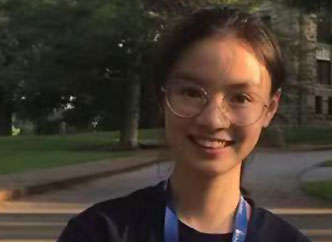 Chinese student Zhiqin Chen is set on a career in chemistry. The obvious choice of Cambridge International A Level subjects for her might have been a mix of science and maths – but instead she chose Cambridge Global Perspectives.
Chinese student Zhiqin Chen is set on a career in chemistry. The obvious choice of Cambridge International A Level subjects for her might have been a mix of science and maths – but instead she chose Cambridge Global Perspectives.
She says the course, and particularly its focus on individual and group research projects, helped her in unexpected ways.
‘I intend to major in chemistry at university and I used to think writing skills, or communication skills in general, were not that important,’ she says.
‘During the research process for Global Perspectives, I read clear and concise articles, as well as arcane articles. I gradually became aware that whatever subjects we major in, communication skills are always of great importance because scientists’ outcomes need to be understood not only by experts but also by people with general or casual knowledge
‘From then on, I paid more attention to the way I write my answers. I have not only achieved higher scores in exams but I also understand the knowledge more deeply.
‘At university, we will have to write papers, thesis, or essays, in whatever subjects we study. I think Global Perspectives is a good transition for us.’
Combining students’ passions with developing their skills
The flexibility of Global Perspectives – with its emphasis on developing thinking and research skills, rather than specific topics – meant Zhiqin could explore a topic she is passionate about: the language of her home region.
‘I live in Suzhou, where fewer and fewer people speak regional dialects. The local dialect is getting endangered. When we look at a global scale, thousands of languages are getting endangered.
‘My Global Perspective class teammates and I are all interested in this topic, so we carried out our group project on this issue.
‘We had three different solutions to reviving endangered languages, so we cooperated but we also competed. When we were looking at evidence we would share it with our teammates if it helped their argument. However, when it came to our presentation we would try to persuade the audience that our own solution is the best.’
Problem solving for life
The group project deepened Zhiqin's knowledge of the issue, and made her a better problem solver overall. She says that unlike some traditional subjects with clear right and wrong answers, Global Perspectives helps students compare and balance viewpoints on any issue.
‘The way we improve our skills is not by repeatedly solving similar problems but by reflecting on ourselves throughout the project. We point out problems for ourselves or our teammates, not by looking at standard answers from a textbook or teacher.
‘I think this process is precious because in real life we don’t always have a model answer telling us how to become better.
The process of discussion and debate has boosted Zhiqin's self-confidence, and also helped her support her friends and classmates.
‘I overcame my stage fright to become a speaker, a debater, and a model diplomat, and I flew to America for a summer camp as the only international student.
‘I think Global Perspectives gave me more courage and let me see a broader world.
‘I encouraged my friends to pursue majors they are interested in, cheering them up when they doubted themselves. I hope someday I can have some impact on society and particularly support women to fulfil their dreams.’
Zhiqin Chen is a student at Ivy Experimental High School in Zhangjiagang, China. The school was established in 2000 and has around 2100 students aged 12 to 18 years old.

